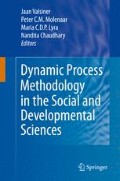Abstract
This book has taken up the challenge to reflect on new paths to develop research methods in psychology and social sciences. Moreover—it also leads us to the clinical field. We can consider psychotherapy as an ongoing process of meaningful exchange between interlocutors—therapist and patient—that takes place in the here-and-now time frame. Of course these features pertain to most human psychological processes that involve transformation in time and construction of meanings about the self and the other. In psychotherapy we emphasize the evolving nature of self experiencing, in permanent change and transformation with some moments of temporal stability assisted by the therapist and a therapeutic setting culturally sanctioned. If we consider in psychotherapy the question about change, or in other words, how transitory experiencing at times becomes stable and constitutes a new state in development, we should be able to search for a methodology that could apprehend transitory phenomena.
Access this chapter
Tax calculation will be finalised at checkout
Purchases are for personal use only
References
Abbey, E. (2004a). Circumventing ambivalence in identity: The importance of latent and overt aspects of symbolic meaning. Culture and Psychology, 10(3), 331–336.
Abbey, E. (2004b). The blind leading the seeing: A new path to self-reflexivity. Culture and Psychology, 10(4), 409–415.
Abbey, E., & Valsiner, J. (2005). Emergence of meaning through ambivalence. Forum Qualitative Sozialforschung/Forum: Qualitative Social Research, 6(1), Article 23. Retrieved May, 2008, from http://www.qualitative-research.net/fqs-tests.htm
Bergson, H. (1896/1959). Materia y memoria. In Obras escogidas. México: Aguilar.
Boesch, E. (2001). Symbolic action theory in cultural psychology. Culture and Psychology, 7(4), 479–483.
Chaudhary, N. (2003). Speaking the self into becoming. Culture and Psychology, 9(4), 471–486.
Josephs, I., & Valsiner, J. (1998). How does autodialogue work? Miracles of meaning making and circumvention strategies. Social Psychology Quarterly, 61(1), 68–83.
Krause, M. (2005). Psicoterapia y cambio: Una mirada desde la subjetividad. Santiago: Ediciones Universidad Católica de Chile.
Leendert, M. (1998). On methodological distinctions: Nomothetic psychology, or historical understanding. Theory & Psychology, 1(8), 39–57.
Marková, I. (2003). Constitution of the self: Intersubjectivity and dialogicality. Culture & Psychology, 9(3), 249–259.
Mead, G. H. (1931/2002). The philosophy of the present. Amherst, MA: Prometheus Books.
Molenaar, P., & Valsiner, J. (2005). How generalization works through the single case: A simple idiographic process analysis of an individual psychotherapy. International Journal of Idiographic Science. Article No. 1. Retrieved March, 2007, from http://www.valsiner.com/articles/molenvals.htm (Available in S. Salvatore et al. (2009), Yearbook of idiographic science 2008. (Vol. 1). Rome: G Fireira Group)
Sato, T., Yasuda, Y., Kido, A., Arakawa, A., Mizoguchi, H., & Valsiner, J. (2007). Sampling reconsidered: Ideographic science and the analyses of personal life trajectories. In J. Valsiner & A. Rosa (Eds.), Cambridge Handbook of Socio-cultural Psychology (Chap. 4). Cambridge: Cambridge University Press.
Siegler, R. S., & Crowley, K. (1991). The microgenetic method: A direct means for studying cognitive development. American Psychologist, 46(6), 606–620.
Simão, L. M. (2007). Why otherness in the research domain of semiotic-cultural contructivism. In L. M Simao & J. Valsiner (Eds.), Otherness in question: Laberinths of the self (pp. 11–36). Charlotte, NC: Info Age Publishers.
Valsiner, J. (1997). Culture and the development of children’s actions. A theory of human development. New York: Wiley.
Valsiner, J. (2000). Culture and human development. London: Sage Publications.
Valsiner, J. (2005). Scaffolding within the structure of dialogical self: Hierarchical dynamics of semiotic mediation. New Ideas in Psychology, 23(3), 197–206.
Valsiner, J. (2006, October 13). From double stars to dialogical self: Constructing new theoretical explanatory systems. Paper presented at the Conference Interaction et Pensée: Perspectives dialoguiques. Lausanne.
Valsiner, J. (2007). Culture in mind and society: Foundations of cultural psychology. New Delhi: Sage Publications.
Valsiner, J., und Diriwächter, R. (2004). Qualitative forschungsmethoden in historiscven und epistemologischen kontexten. Qualitative Forschung in der Entwicklungspsychologie. Deutschland: Kölner Studien Verlag.
Valsiner, J., & Sato, T. (2005). Historically structured sampling (HSS): How can psychology´s methodology become tuned in to the reality of the historical nature of cultural psychology? In J. Straub, C. Kolbl, D. Wieideman, & B. Zielke (Eds.), Pursuit of meaning. Bielefeld: Transcript.
Valsiner, J., & van der Veer, R. (2000). The social mind. Construction of the idea. Cambridge: Cambridge University Press.
Zittoun, T. (2006, June 1–2). Using symbolic resources, playing with time. Paper presented at symposium: Past and future within dialogical self. Fourth International conference on dialogical self, Braga.
Author information
Authors and Affiliations
Corresponding author
Editor information
Editors and Affiliations
Rights and permissions
Copyright information
© 2009 Springer Science+Business Media, LLC
About this chapter
Cite this chapter
Molina, M., Rio, M.d. (2009). Dynamics of Psychotherapy Processes. In: Valsiner, J., Molenaar, P., Lyra, M., Chaudhary, N. (eds) Dynamic Process Methodology in the Social and Developmental Sciences. Springer, New York, NY. https://doi.org/10.1007/978-0-387-95922-1_20
Download citation
DOI: https://doi.org/10.1007/978-0-387-95922-1_20
Published:
Publisher Name: Springer, New York, NY
Print ISBN: 978-0-387-95921-4
Online ISBN: 978-0-387-95922-1
eBook Packages: Behavioral ScienceBehavioral Science and Psychology (R0)

